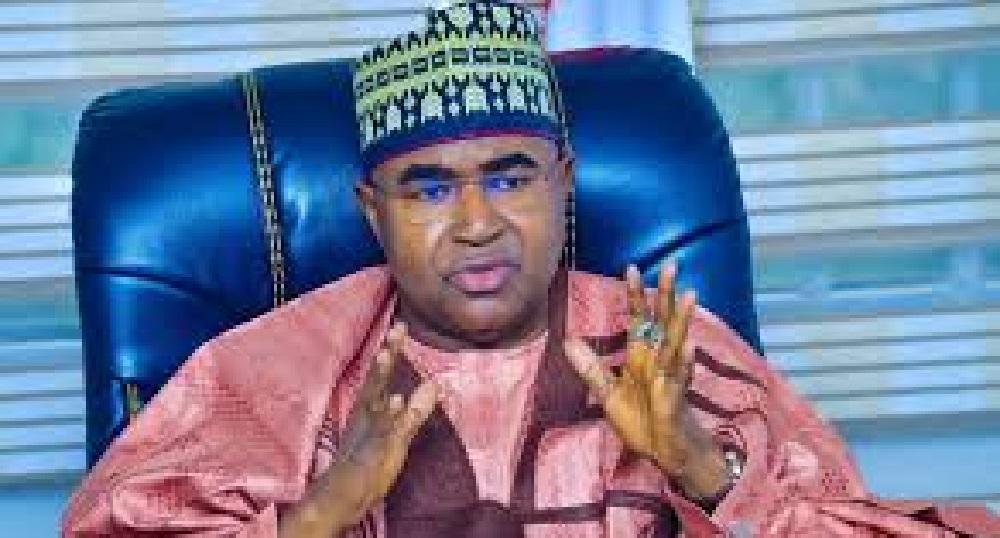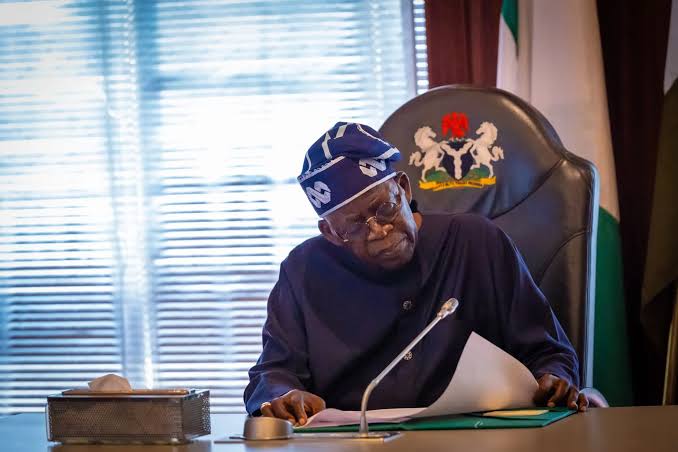News
Marwa insists on drug tests for corps members

The Chairman and Chief Executive Officer of the National Drug Law Enforcement Agency, Brig. Gen. Buba Marwa (retd.), has reiterated the agency’s call for mandatory drug tests for corps members, describing the initiative as a preventive—not punitive—measure.
Speaking during a courtesy visit by the Director General of the National Youth Service Corps, Brig. Gen. Olakunle Nafiu, and senior NYSC officials to the NDLEA headquarters in Abuja, Marwa emphasised the urgent need to curb drug abuse among Nigerian youth.
The visit was confirmed in a statement issued on Wednesday by NDLEA spokesperson, Femi Babafemi.
Marwa noted that the proposed drug integrity test, which has drawn mixed reactions online, particularly targets early detection and intervention.
“This is not a punitive action,” he stressed. “The goal is prevention—helping individuals before drug use escalates into addiction.”
Citing data from national drug surveys, he revealed, “One in seven Nigerians aged 15 to 64 is involved in drug use. The drug scourge continues to ravage our families and communities. There is no part of this country untouched by the crisis.”
According to him, the NDLEA’s strategy is twofold—reducing supply while also diminishing demand through education, counseling, and rehabilitation.
Highlighting the NDLEA’s collaboration with NYSC, Marwa lauded the formation of War Against Drug Abuse clubs in NYSC orientation camps and proposed deeper cooperation, including mandatory drug tests for corps members.
“In addition to suggesting that intending couples obtain drug-free certificates, we believe early detection through drug tests can prevent severe consequences, including psychiatric disorders, which affect not only users but the society at large,” he said.
To further strengthen drug prevention efforts, Marwa suggested deploying corps members with backgrounds in psychology, nursing, psychiatry, or counseling to NDLEA Counselling and Treatment Centres across the country for their primary assignments.
“This will deepen their professional experience and enhance the agency’s rehabilitation efforts,” he added.
Responding, the NYSC DG described the proposal as a “fantastic idea,” pledging to review the NDLEA’s recommendations for possible implementation.
Nafiu also assured that the NYSC would develop a comprehensive framework to facilitate the posting of qualified corps members to NDLEA commands, particularly those with active counseling and treatment facilities.
He commended Marwa for his leadership and reaffirmed the NYSC’s commitment to strengthening its partnership with the NDLEA in tackling drug abuse among Nigerian youth.
News
Onanuga faults Adesina’s assessment of Nigeria’s progress since independence

By Francesca Hangeior
The Presidential aide Bayo Onanuga has faulted recent claims by outgoing African Development Bank President Akinwumi Adesina that Nigerians are worse off today than they were in 1960, describing the assertion as “based on figures that do not align with available data.”
In a post on X (formerly Twitter) on Monday, Onanuga argued that Adesina’s comparison of Nigeria’s GDP per capita in 1960 and 2025 was flawed and misleading.
“According to Nairametrics, he claimed that Nigeria’s GDP per capita in 1960 was $1,847 and that it is $824 today. The quoted figures are not correct,” he wrote.
He cited data showing that Nigeria’s GDP in 1960 was $4.2 billion, with a population of 44.9 million, putting per capita income at just $93. “Ninety-three, not even one hundred dollars,” he emphasised.
Onanuga further noted that Nigeria’s economic growth only began to rise significantly in the 1970s due to oil revenue.
“Our country’s GDP did not rise remarkably until the 1970s, when crude earnings ballooned. In 1970, our GDP rose to $12.55 billion. In 1975, it was $27.7 billion, $64.2 billion in 1980, and $164 billion in 1981. Up until 1980, per capita income did not exceed $880. It rose to $2187 in 1981 and dropped to $1844 in 1982,” he said, adding that it reached a peak of $3,200 in 2014 after a GDP rebasing.
He questioned Adesina’s data sources, stating, “These facts raise questions about the source of Dr. Adesina’s figures.”
Beyond the figures, Onanuga said the real issue was the conclusion drawn from them.
“GDP per capita is not the only criterion used to determine whether people live better lives now than in the past. Indeed, it is a poor tool for assessing living standards,” he stated.
He argued that GDP masks economic realities such as wealth distribution, informal economic activity, and quality of life indicators.
“GDP per capita is silent on whether Nigerians in 2025 enjoy better access to healthcare, education, and transportation, such as rail and air transport than in 1960,” he added.
Highlighting the digital revolution, Onanuga recalled that in 1960, Nigeria had only 18,724 telephone lines for about 45 million people.
Today, over 200 million Nigerians have access to mobile and digital services.
“Does this MTN experience correlate with a country worse off than in 1960, when we had analogue telephones and the number of lines was fewer than 20,000?” he asked, referencing MTN’s N1 trillion revenue and 84 million users in Q1 2025.
He also criticised Adesina for what he described as a politically motivated statement.
“Adesina spoke like a politician, in the mould of Peter Obi, and did not do due diligence before making his unverifiable statement,” he said.
Onanuga concluded that Nigeria’s current economic scale is unrecognisable compared to the 1960s.
“Today, as we await the NBS’s recalibration of our GDP, we can comfortably say without contradiction that it is at least 50 times, if not 100 times, more than it was at Independence.”
News
FG rolls out loan initiative for creatives, entrepreneurs

By Francesca Hangeior
The Federal Ministry of Art, Culture, Tourism, and Creative Economy has announced the introduction of the Creative Economy Development Fund which is tailored to roll out loan opportunities for creatives.
In a statement by Nneka Anibueze, Special Adviser to the minister of Arts, Culture and Creative Economy, Hannatu Musawa on Monday, the ministry invited eligible creatives, entrepreneurs, and organisations to apply for funding through the Creative Economy Development Fund.
“The CEDF is a bold step towards realizing President Bola Ahmed Tinubu’s Renewed Hope Agenda, aimed at fostering job creation, economic diversification, and enhancing Nigeria’s global cultural influence,” the statement said.
Musawa said that the fund is a strategic national investment designed to unlock the vast potential of Nigeria’s creative sector, positioning it as a driver of economic growth and cultural diplomacy.
“This is not just a financial intervention. It is a call to action for creatives, entrepreneurs, and industry enablers to scale their dreams and contribute to a thriving, inclusive creative economy,” the Minister said.
The fund provides tailored financial support through debt, equity, and grant funding to boost promote innovation, and increase global visibility for Nigeria’s creative assets, cultural projects, and tourism-linked enterprises.
CEDF supports creative businesses by providing capital to scale production, expand market access, and build resilience. It also allows creators to leverage intellectual property as a financial asset, unlocking the value of film rights, music catalogues, digital content, and other creative works.
The initiative according to the statement offers various funding options for creative businesses, including; Affordable loans and credit facilities for businesses across sectors such as film, music, fashion, art, publishing, gaming, and cultural tourism. Equity and quasi-equity investments in high-growth creative enterprises, Grant funding for socially impactful and innovative cultural projects and focus on leveraging intellectual property as a bankable asset aclass for securing financing.
“The application process will be rolled out in phases, with the first call for proposals open till May 30, 2025, prioritizing mature projects seeking over $100,000.
The second phase will open on August 4, 2025, focusing on Micro Small and Medium Enterprises MSMEs and Small and Medium Enterprises SMEs requesting under $100,000.
“Application review, project onboarding, incubation, and acceleration for Phase One will take place from June to December 2025, with the disbursement of funds starting on January 1, 2026. For Phase Two, disbursements will start on April 1, 2026.
“The fund is open to individuals, businesses, and institutions operating across the creative and cultural economy, including writers, directors, artists, fashion designers, gaming studios, cultural tourism providers, training institutions, promoters, legal consultants, media agencies, digital platforms, and logistics companies.
“Applications will be assessed by independent professionals with oversight from a private sector investment committee. The Creative Economy Development Fund is structured as an independent, professionally managed investment fund, with the Ministry of Finance Incorporated serving as the anchor shareholder. Interested investors and development partners are encouraged to reach out regarding co-investment opportunities or participation in specific sub-funds.”
News
A Year After: Rt. Hon. Nnolim Nnaji Reflects On Late Senator Ayogu Eze’s Life

Rt. Hon. Sir Nnolim Nnaji of the Nkanu East/West Federal Constituency in the House of Representatives has expressed a deep sense of void, a year after the untimely departure of his friend, late Senator Ayogu Eze.
In a statement in Abuja, Nnaji said, “It is with profound sadness that I reflect on the passing of Senator Ayogu Eze, a distinguished statesman, dedicated public servant, and cherished friend.
“His untimely departure a year ago created a gap in our lives and in the Nigerian halls of Power where he made significant contributions and positive impacts.
“Senator Ayogu Eze’s legacy is marked by his tireless advocacy for the people he served, his unwavering commitment to justice, and his unrelenting passion for the development of his community and the nation.
“His vibrancy, advocacy and vision in 6th and 7th Senates where he chaired Committees on Information & Media and also Works, inspired countless individuals, and his impact will be felt for generations to come.”
Late Senator Ayogu Eze also served on the board of the Nigerian Maritime Administration and Safety Agency, (NIMASA) and a Commissioner representing Enugu State in Revenue Mobilisation Allocation and Fiscal Commission, (RMAFC) after leaving the Senate.
“On behalf of my family and the entire constituents of Nkanu East/ West Federal Constituency of Enugu State l pray for his continued rest in the Lord.”
-

 News17 hours ago
News17 hours agoVDM: Release my guy now, singer Davido tells EFCC
-

 News16 hours ago
News16 hours agoFormer Plateau deputy governor is dead
-

 Economy7 hours ago
Economy7 hours ago75.5% of rural Nigerians now live below poverty line — World Bank
-

 News23 hours ago
News23 hours agoINTERPOL uncovers 150 stolen vehicles from Canada in Nigeria, Gambia, other W.A. countries
-

 News8 hours ago
News8 hours agoMassive turnout as Bishop David Abioye holds first service in new church + Video
-

 News22 hours ago
News22 hours agoPolice nab kidnapper after transfer of N70m from victim’s account
-

 News17 hours ago
News17 hours ago“I’m not thinking of a third term agenda -Trump
-

 News8 hours ago
News8 hours agoHow US-Based Yoruba Monarch Died After Brutal Assault In Oyo Palace, Allegedly Ordered By Alaafin Amid Supremacy Row With Ooni Of Ife






